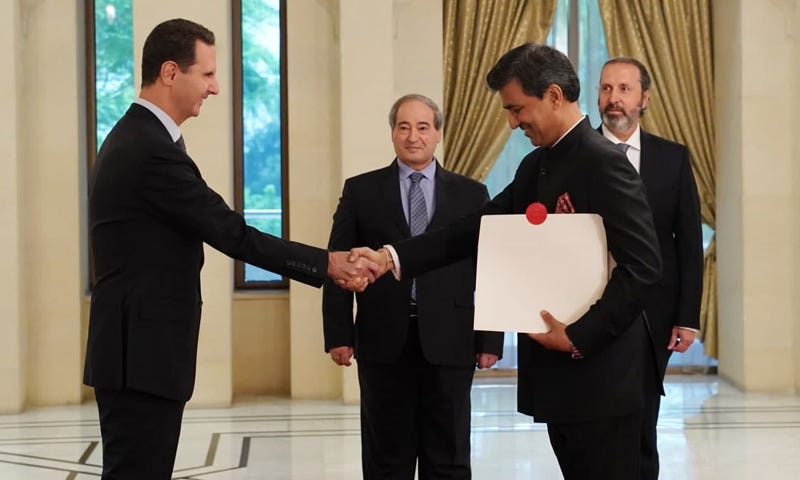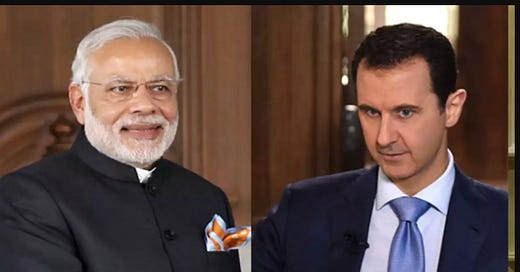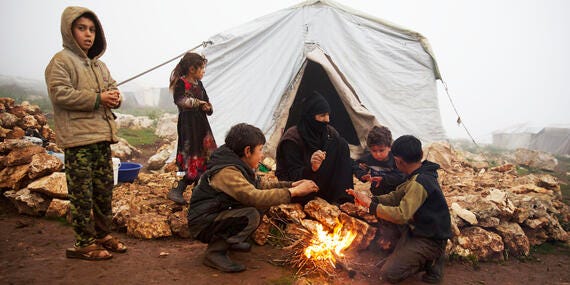The Future of India’s Relationship with Syria: What’s Next?
As Assad’s rule ends, India must navigate security risks, safeguard investments, manage regional alliances, and contribute to humanitarian aid and post-conflict reconstruction in a volatile Syria.
The collapse of Bashar al-Assad's 24-year rule in Syria marks a major inflection point in the region’s geopolitical landscape. For India, this presents a time of both risk and opportunity. While the situation remains uncertain, there’s a chance for us to step in and shape things in our favor — if we play our cards right.
Our relationship with Syria, rooted in mutual respect and shared interests has always been cordial, built on a strong foundation of deep understanding. Since the Syrian Civil War broke out in 2011, South Block has been clear on its stance: we’ve always backed a peaceful, Syrian-led resolution to the conflict. Even when chaos took over, we didn't leave or give in to Western pressure to punish Syria through sanctions. We kept our embassy open in Damascus and stayed committed to our long-standing ties with Assad’s government.

Under Assad, Syria was an important ally of ours, especially when it came to issues like Kashmir. Syria staunchly supported our position on Kashmir, endorsing the view that it is an internal matter, to be dealt by India alone. A position that aligns with our broader strategic goals. However, now with Assad gone, we’re left wondering: what’s next in our relationship with Syria? Will the next government continue to align with us, or will the shifting political winds push Syria in a different direction?
One of our biggest concerns is the security threat posed by extremist elements in Syria. Under Assad, Syria acted as a buffer against the rise of ISIS and other jihadist groups that threatened the stability of the region. With Assad losing power, there is a real danger that these groups could consolidate and expand their influence. Radical ideologies taking root in Syria could spill over into our subcontinent, further complicating an already volatile security environment.

Our economic interests in Syria are at risk as well. Indian companies, particularly ONGC, have significant investments in Syria’s oil and gas sector dating back to 2004. We’ve been involved in supporting various infrastructure development projects across the country too. The ongoing instability and possibility of extremist groups gaining control over key economic hubs, make our investments increasingly vulnerable.
Further, looking at the bigger picture, the shifting political and power dynamics in Syria will have a ripple effect on our diplomatic approach in the Middle East. We've always walked a fine line in our ties with Iran and the Gulf nations. A changing Syria makes this balance even more difficult to sustain. Therefore, now is the time for us to be flexible and quick in navigating these new geopolitical dynamics to ensure that any of our crucial partners in the region aren't alienated. There is also a possibility of the post- Assad Syria turning into a battleground for regional powers like Russia, Turkey, and Iran, each trying to get the upper hand. This competition could lead to a more fragmented political environment, one which would require us to carefully manage our alliances and interests while avoiding being drawn into any regional rivalries.
Beyond these issues, we need to focus on the ongoing humanitarian crisis in Syria, as millions are being displaced and facing unimaginable suffering. We have a chance to play a constructive role by offering humanitarian aid, which would help alleviate the immediate suffering and at the same time enhance our reputation as a responsible global power—one that is deeply committed to peace and humanitarian values.
Additionally, our extensive experience in the domains of international conflict resolution, peacekeeping, and post-conflict reconstruction positions us as a potential key player in the rebuilding of Syria’s institutions. We can help the country transition towards a peaceful, stable and democratic future.
So, as the world witnesses Syria heading towards an increasingly uncertain future, our response must be strategic, multi-dimensional and responsive to the rapidly changing political and security environment, to ensure our interests and values continue to be secured in the volatile region!





